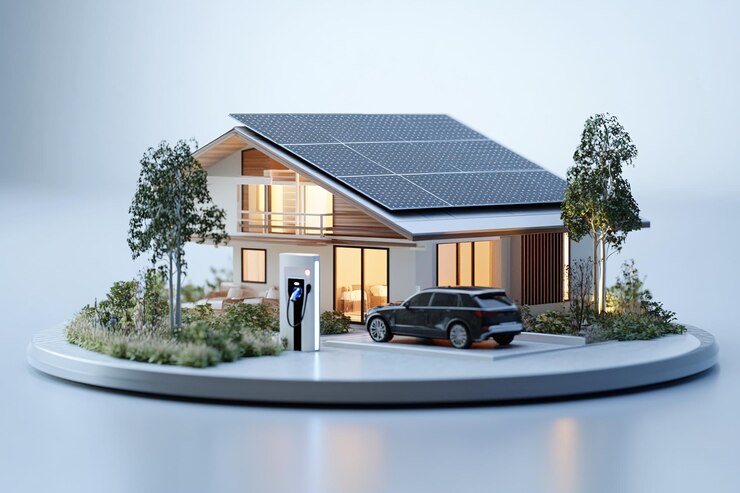Table of Contents
In sunny Florida, the allure of solar panels is hard to resist. With abundant sunlight and rising energy costs, many homeowners are turning to solar energy as a sustainable and cost-effective solution. But what does this mean for your home insurance? In this comprehensive guide, we’ll explore how solar panels and home insurance in Florida intertwine, uncovering both benefits and potential pitfalls.
more information click here
Understanding the Basics of Solar Panels and Home Insurance in Florida
Before diving deep, it’s essential to grasp the relationship between solar panels and home insurance in Florida. Home insurance generally covers damage to your home and belongings, including installed systems like solar panels. However, there are nuances that every homeowner should be aware of.
The Value of Solar Panels

One of the most significant factors to consider is how can increase the value of your home. In Florida, homes equipped with often appraise higher than those without. This added value can influence your home insurance policy. Insurers may view homes with as less risky, potentially leading to lower premiums.
more information click here
Coverage for Solar Panels
When considering and home insurance in Florida, understanding coverage is crucial. Many homeowners assume their existing policies cover but this isn’t always the case. It’s vital to check with your insurance provider to ensure your solar installation is adequately covered.
Full Coverage: Some policies automatically include coverage for , while others require an endorsement.
Separate Policy: In certain cases, homeowners may need a separate policy specifically for solar systems.
Installation and Liability
The installation of can also impact your home insurance in Florida. If the installation isn’t performed correctly, it can lead to issues down the line. For instance, if a poorly installed solar system causes damage to your roof, you might face challenges when filing a claim. Insurers will want to know that the installation met industry standards.
Maintenance Matters
Regular maintenance of is not just good for efficiency; it’s also crucial for insurance purposes. Homeowners need to maintain their systems to prevent damage and ensure longevity. Neglecting maintenance could result in higher risks and potential issues when seeking claims.
Professional Inspections: Regular inspections can help identify issues before they escalate, making the claim process smoother.
Document Everything: Keeping records of maintenance can help substantiate your claims should you need to file one.
Potential Risk
While offer many benefits, they also come with potential risks. Understanding these risks is vital when considering and home insurance in Florida.
Storm Damage: Florida is prone to severe weather, including hurricanes and heavy rains. can sustain damage during these events, which may lead to significant repair costs.
Fire Hazards: While rare, faulty solar panel systems can pose fire risks. It’s essential to ensure your system is installed and maintained by qualified professionals.
Discounts and Incentive
Many insurers recognize the environmental benefits of solar energy. As a result, some companies offer discounts on premiums for homes equipped with.
Green Home Discounts: Check with your insurance provider to see if they offer any incentives for renewable energy systems.
Tax Incentives: In addition to insurance discounts, Florida homeowners can also benefit from state and federal tax incentives for solar energy installations.
Finding the Right Insurance Policy

When exploring solar panels and home insurance in Florida, finding the right policy is essential.
Research Insurers: Not all insurance providers treat the same way. Research companies that are favorable toward renewable energy.
Compare Quotes: Get quotes from multiple providers to find the best coverage at the most competitive rate.
Consult Experts: Work with insurance agents who understand the nuances of and home insurance in Florida.
In conclusion, the integration of and home insurance in Florida can be a winning combination for many homeowners. While there are considerations to keep in mind, such as installation quality, maintenance, and potential risks, the benefits often outweigh the drawbacks. By understanding your coverage options and actively seeking out policies that accommodate solar energy systems, you can protect your investment and enjoy the many perks of renewable energy.
FAQ: Solar Panels and Home Insurance in Florida
As Florida homeowners increasingly embrace solar energy, questions surrounding and home insurance become more prevalent. This comprehensive FAQ aims to clarify the intricacies of how affect home insurance in the Sunshine State. From coverage specifics to potential risks, this guide will help you make informed decisions.
What Are Solar Panels?
are devices that convert sunlight into electricity. They consist of photovoltaic cells that capture solar energy and transform it into usable power for homes and businesses. Given Florida’s abundant sunshine, solar panels are an attractive option for many homeowners looking to reduce their electricity bills and minimize their carbon footprint.
Why Consider in Florida?
Florida is one of the sunniest states in the U.S., making it ideal for solar energy generation. Here are some reasons to consider solar panels:
Cost Savings: Reduced electricity bills due to self-generated power.
Environmental Impact: Decreased reliance on fossil fuels and reduced carbon emissions.
Increased Home Value: -equipped homes often appraise higher than non-solar homes.
How Do Affect Home Insurance?
When integrating solar panels into your home, it’s essential to understand their impact on your home insurance policy:
Increased Value: Homes with solar panels typically have a higher market value, which can affect your insurance premiums.
Coverage Requirements: Your existing home insurance may not automatically cover solar panels, necessitating policy adjustments.
Are Covered Under Standard Homeowners Insurance?
This varies by policy and provider. Most standard homeowners insurance policies do not automatically include coverage for Here’s what you need to know:
Endorsements: Some insurers offer endorsements that expand coverage to include solar systems.
Separate Policies: In some cases, homeowners might need a separate policy specifically for their solar energy systems.
What Types of Damage to Solar Panels Are Covered?
Coverage for solar panels generally includes:
Weather Damage: Damage from storms, hail, or falling trees.
Vandalism: Coverage against intentional damage.
Theft: Protection if your solar panels are stolen.
However, it’s crucial to confirm with your insurer what specific types of damage are covered under your policy.
What Should Homeowners Do Before Installing ?
Before installing , homeowners should:
Consult Your Insurance Provider: Ask how will affect your policy.
Review Your Current Coverage: Determine if your existing policy covers solar panels or if adjustments are needed.
Get Multiple Quotes: Research different insurance providers to find the best coverage options.
How Can Solar Panel Installation Affect Insurance Premiums?

installation can lead to changes in insurance premiums for several reasons:
Increased Value: Higher property value may lead to higher premiums.
Risk Assessment: Insurers may view solar panel systems as lower risk due to energy savings, potentially reducing premiums.
What Are the Risks Associated with
While solar panels offer numerous benefits, there are some risks:
Installation Issues: Poor installation can lead to damage or operational failures.
Weather Vulnerability: Severe weather, such as hurricanes, can damage
Maintenance Needs: Neglected panels can lead to performance issues, affecting overall efficiency and insurance claims.
How Important Is Maintenance for
Regular maintenance is critical for ensuring your solar panels operate efficiently and last longer. Here’s why:
Performance: Dirty or damaged panels produce less energy, leading to financial loss.
Insurance Claims: Proper maintenance can help prevent issues that could complicate claims.
What Are the Benefits of Having
The benefits of installing solar panels include:
Energy Independence: Reduced reliance on utility companies.
Cost Savings: Lower electricity bills and potential tax incentives.
Environmental Impact: Contribution to renewable energy and reduction of carbon footprint.
To potentially lower insurance premiums after installing solar panels, homeowners can:
Shop Around: Compare policies from multiple insurers to find the best rates.
Seek Discounts: Look for insurers offering discounts for renewable energy systems.
Improve Home Security: Install security measures to protect against theft and vandalism.
Are There Tax Incentives for Solar Panel Installation in Florida?
Yes, Florida offers various tax incentives for homeowners who install solar panels, including:
Federal Tax Credit: A percentage of installation costs can be claimed on federal taxes.
Sales Tax Exemption: Solar energy systems are exempt from state sales tax.
How Do I Choose the Right Insurance Provider for
When selecting an insurance provider, consider the following:
Experience with Solar Energy: Choose a provider familiar with solar energy systems.
Policy Flexibility: Look for policies that can easily accommodate solar panel coverage.
Customer Reviews: Research customer feedback regarding claims handling and overall satisfaction.
What Documentation Is Needed for Insurance Claims Related to
When filing an insurance claim for solar panel damage, you may need:
Installation Records: Documentation showing the installation was completed by a certified professional.
Maintenance Records: Proof of regular maintenance can strengthen your claim.
Photographs: Pictures of the damaged panels and the surrounding area.
How Do I File a Claim for Damage to Solar Panels?
To file a claim for damaged solar panels, follow these steps:
Contact Your Insurer: Notify them of the damage and your intent to file a claim.
Document the Damage: Take detailed photographs and notes about the incident.
Submit Required Documentation: Provide any necessary documents, such as installation and maintenance records.
Follow Up: Stay in touch with your insurance representative throughout the claims process.
What Happens If My Are Damaged During a Hurricane?
If your solar panels are damaged during a hurricane, your insurance may cover the repairs or replacement. Here’s what to do:
File a Claim: As mentioned, promptly contact your insurer and provide necessary documentation.
Assess Damage: If safe, evaluate the extent of the damage to your .
Get Estimates: Obtain repair estimates from qualified professionals to support your claim.
Pros and Cons of Solar Panels and Home Insurance in Florida
As Florida homeowners consider the installation of solar panels, it’s essential to weigh the benefits and potential drawbacks, especially in relation to home insurance. Here’s a detailed breakdown of the pros and cons.
Pros of Solar Panels
- Cost Savings on Energy Bills
can significantly reduce monthly electricity costs. Homeowners can generate their own electricity, leading to lower utility bills, which is particularly beneficial in a state with high sunshine availability. - Increased Home Value
Homes equipped with often appraise higher than those without. This increase in property value can provide a solid return on investment when it’s time to sell. - Environmental Benefits
Using solar energy reduces reliance on fossil fuels, leading to lower carbon emissions. For environmentally conscious homeowners, this is a significant advantage. - Tax Incentives
Florida offers various tax incentives for solar installation, including federal tax credits and state exemptions, making solar panels a more attractive financial option. - Insurance Discounts
Some insurance providers offer discounts for homes with recognizing the lower risk associated with energy-efficient homes. - Energy Independence
Generating your own electricity provides more control over energy costs and shields homeowners from rising utility prices. - Low Maintenance Requirements
Once installed, generally require minimal maintenance, especially if installed by a reputable contractor.
Cons of Solar Panels
- Initial Installation Costs
The upfront cost of solar panel installation can be substantial. While there are incentives available, the initial investment can be a barrier for some homeowners. - Insurance Coverage Complexity
Not all homeowners insurance policies automatically cover . Homeowners may need to adjust their policies, leading to potential confusion or added costs. - Potential for Damage
Solar panels can be vulnerable to extreme weather conditions common in Florida, such as hurricanes and heavy storms. Damage to panels could lead to costly repairs and complications with insurance claims. - Limited Efficiency During Cloudy Days
While Florida has plenty of sunny days, energy production can decrease on overcast days or during rainy seasons, affecting the overall energy savings. - Aesthetic Concerns
Some homeowners may not like the appearance of on their roofs, viewing them as an eyesore that can detract from the home’s aesthetic appeal. - Complexities in Selling the Home
If you plan to move, transferring solar panel ownership or leasing agreements can complicate the home sale process. - Maintenance and Repairs
Although generally low-maintenance, solar panels may require occasional cleaning or repairs. If not properly maintained, their efficiency can decline over time.
Conclusion
In summary, solar panels offer numerous benefits for Florida homeowners, particularly in terms of cost savings, increased home value, and environmental impact. However, potential drawbacks, such as initial costs, insurance complexities, and risks associated with extreme weather, warrant careful consideration.
Before making a decision, it’s crucial to assess your financial situation, consult with insurance professionals, and evaluate the long-term benefits of solar energy for your home.






